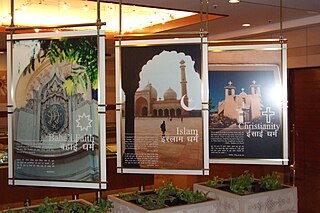Progressive may refer to:
Progressive may refer to:
Feminist theology is a movement found in several religions, including Buddhism, Hinduism, Sikhism, Neopaganism, Baháʼí Faith, Judaism, Islam, Christianity and New Thought, to reconsider the traditions, practices, scriptures, and theologies of those religions from a feminist perspective. Some of the goals of feminist theology include increasing the role of women among clergy and religious authorities, reinterpreting patriarchal (male-dominated) imagery and language about God, determining women's place in relation to career and motherhood, studying images of women in the religions' sacred texts, and matriarchal religion.
The term Judeo-Christian is used to group Christianity and Judaism together, either in reference to Christianity's derivation from Judaism, Christianity's recognition of Jewish scripture to constitute the Old Testament of the Christian Bible, or values supposed to be shared by the two religions. The term Judæo Christian first appeared in the 19th century as a word for Jewish converts to Christianity. The term has received much criticism, largely from Jewish thinkers, as relying on and perpetuating inherently antisemitic notions of supersessionism, as well as glossing over fundamental differences between Jewish and Christian thought, theology, culture and practice.
Liberal or liberalism may refer to:
Orthodox, Orthodoxy, or Orthodoxism may refer to:

Reform Judaism, also known as Liberal Judaism or Progressive Judaism, is a major Jewish denomination that emphasizes the evolving nature of Judaism, the superiority of its ethical aspects to its ceremonial ones, and belief in a continuous revelation which is closely intertwined with human reason and not limited to the Theophany at Mount Sinai. A highly liberal strand of Judaism, it is characterized by little stress on ritual and personal observance, regarding Jewish law as non-binding and the individual Jew as autonomous, and by a great openness to external influences and progressive values.

In religion and theology, revelation is the disclosing of some form of truth or knowledge through communication with a deity (god) or other supernatural entity or entities.
Universalism is the philosophical and theological concept that some ideas have universal application or applicability.

Comparative religion is the branch of the study of religions with the systematic comparison of the doctrines and practices, themes and impacts of the world's religions. In general the comparative study of religion yields a deeper understanding of the fundamental philosophical concerns of religion such as ethics, metaphysics and the nature and forms of salvation. It also considers and compares the origins and similarities shared between the various religions of the world. Studying such material facilitates a broadened and more sophisticated understanding of human beliefs and practices regarding the sacred, numinous, spiritual and divine.

Proselytism is the policy of attempting to convert people's religious or political beliefs. Carrying out attempts to instill beliefs can be called proselytization.
Liberalism and progressivism within Islam involve professed Muslims who have created a considerable body of progressive thought about Islamic understanding and practice. Their work is sometimes characterized as "progressive Islam". Some scholars, such as Omid Safi, differentiate between "Progressive Muslims" versus "Liberal advocates of Islam".

In the Book of Ezekiel in the Hebrew Bible, New Jerusalem is Ezekiel's prophetic vision of a city centered on the rebuilt Holy Temple, the Third Temple, to be established in Jerusalem, which would be the capital of the Messianic Kingdom, the meeting place of the twelve tribes of Israel, during the Messianic era. The prophecy is recorded by Ezekiel as having been received on Yom Kippur of the year 3372 of the Hebrew calendar.

Unity of religion is a core teaching of the Baháʼí Faith which states that there is a fundamental unity in many of the world's religions. The principle states that the teachings of the major religions are part of a single plan directed from the same God. It is one of the core teachings of the Baháʼí Faith, alongside the unity of God, and the unity of humanity.
To be multifaith is to feel an affinity with aspects of more than one religion, philosophy or world-view, or to believe that none of them is superior to the others. This term should not be confused with interfaith, which concerns the communication between different religions.

The Baháʼí conception of God is of an "unknowable essence" who is the source of all existence and known through the perception of human virtues. The Baháʼí Faith follows the tradition of monotheism and dispensationalism, believing that God has no physical form, but periodically provides divine messengers in human form that are the sources of spiritual education. In another sense, Baháʼí teachings on God are also panentheistic, seeing signs of God in all things, but the reality of God being exalted and above the physical world.
Qur'anic hermeneutics is the study of theories of the interpretation and understanding of the Qur'an, the central text of Islam. Since the early centuries of Islam, scholars have sought to mine the wealth of its meanings by developing a variety of different methods of hermeneutics. Many of the traditional methods of interpretation are currently being challenged with a more modern or contemporary approach. The three primarily established typologies of tafsir are tradition (Sunni), opinion (Shi'i), and allegory (Sufi). The two main types of verses to be interpreted are Muhukmat and Mutishabihat. The traditional approach to hermeneutics within the Qur'an embodies an awareness of isnad. There are many challenges of addressing modern day human rights, women and minority groups through the traditional hermeneutical model.
Ethical monotheism is a form of exclusive monotheism in which God is believed to be the only god as well as the source for one's standards of morality, guiding humanity through ethical principles.
Religious liberalism is a conception of religion which emphasizes personal and group liberty and rationality. It is an attitude towards one's own religion which contrasts with a traditionalist or orthodox approach, and it is directly opposed by trends of religious fundamentalism. It is related to religious liberty, which is the tolerance of different religious beliefs and practices, but not all promoters of religious liberty are in favor of religious liberalism, and vice versa.
Progressivism is a political philosophy and movement that seeks to advance the human condition through social reform – primarily based on purported advancements in social organization, science, and technology. Adherents hold that progressivism has universal application and endeavor to spread this idea to human societies everywhere. Progressivism arose during the Age of Enlightenment out of the belief that civility in Europe was improving due to the application of new empirical knowledge.
Centre-left politics is the range of left-wing political ideologies that lean closer to the political centre and broadly conform with progressivism. Ideologies of the centre-left include social democracy, social liberalism and green politics. Ideas commonly supported by the centre-left include welfare capitalism, social justice, liberal internationalism, and multiculturalism. Economically, the centre-left supports a mixed economy in a democratic capitalist system, often including economic interventionism, progressive taxation, and the right to unionize. Centre-left politics are contrasted with far-left politics that reject capitalism or advocate revolution.
A religious reform aims at the reform of religious teachings. It is not to be confused with an organizational reform of a religious community, though mostly this is a consequence of a reform of religious teachings.